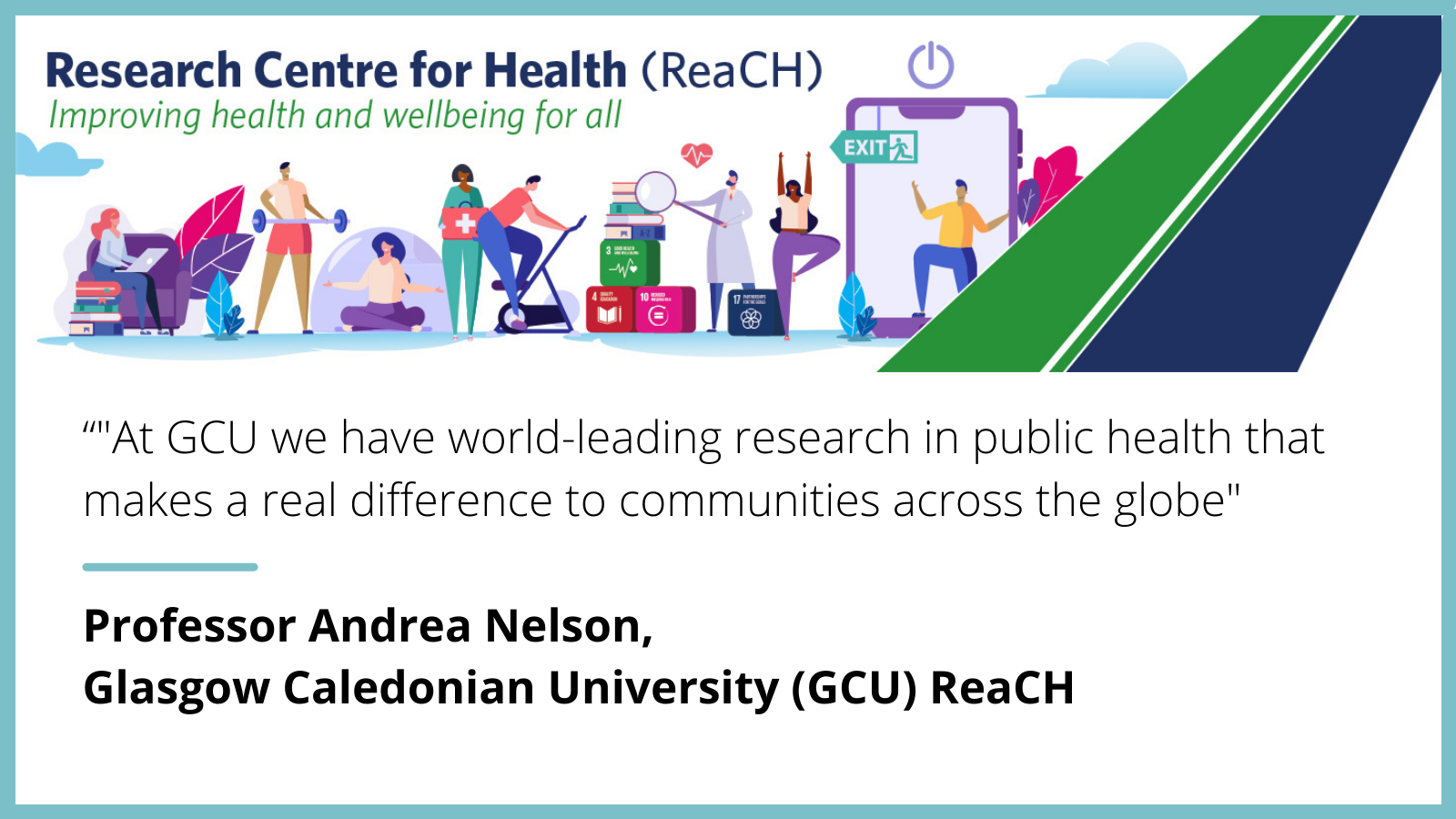ReaCHing out in response to COVID-19
Posted 2021-05-18 09:16:57 by Michelle Ierna

The mission of the recently launched Research Centre for Health (ReaCH) at Glasgow Caledonian University (GCU) is to reach out to communities to make a positive difference to the quality of people’s lives in Scotland and around the world through research excellence in managing public health and long-term conditions.
ReaCH researchers already had a well-established and successful partnership working alongside the Scottish government, NHS and Public Health Scotland (PHS) meaning that as soon as the pandemic took hold across the UK in March 2020, they were perfectly placed to rapidly deploy their research expertise in support of our frontline healthcare workers in the UK-wide effort to tackle the COVID-19 pandemic. Here, we highlight some of the vital and impactful GCU- led COVID-19 research that our team of multi-disciplinary researchers have contributed to in the past year.
The Sexual Health and Blood Borne Virus (SHBBV) research group led by Professors Sharon Hutchinson , Claudia Estcourt and David Goldberg has been at the heart of major research providing important epidemiological insights on COVID-19 to policymakers to aid the public health response from the outset. Their research has been published in two prestigious journals, the first published in the Public Library of Science (Medicine) demonstrated that along with being older and male, severe COVID-19 disease is strongly associated with past medical history across all age groups in Scotland.
The second paper published in the British Medical Journal found that healthcare workers and members of their household contributed a sixth of COVID-19 cases admitted to hospital among working age adults in Scotland during the first wave. Furthermore, Senior research fellow Dr Norah Palmateer and Reader Dr Andrew McAuley , are co-leading an ongoing NHS Public Health Scotland enhanced surveillance team to find out how many people have been exposed to COVID-19. This workstream publishes weekly data related to COVID prevalence on a public-facing dashboard .
Similarly, The Chief Scientist Office launched the Rapid Research in Covid-19 programme and two ReACH research teams were successful in gaining this prestigious funding. The first study, a systematic Cochrane review of the literature, led by Dr Alex Pollock focussed on the effectiveness of interventions to support the resilience and mental health of frontline health and social care professionals during and after disease epidemics/pandemics. The review highlighted a lack of properly planned research studies which could better inform ways to support the mental health and resilience of healthcare professionals and has been the subject of a recent submission to the Parliamentary Office of Science and Technology to inform a UK Parliamentary briefing. The second, based on surveys and qualitative research interviews conducted by Dr Jamie Frankis , investigated the impact of COVID-19 social distancing on the mental health vulnerabilities of Gay, Bisexual and other Men who have sex with men (GBM) demonstrating that as a result of lockdown, almost half of the GBM group (44%) reported negative impacts on their mental health.
Finally, Professor Lesley Price , the co-lead of the Safeguarding Health through Infection Prevention (SHIP) Research Group , was appointed by Public Health Scotland to coordinate the Scottish arm of the UK-wide SIREN study, the largest cohort study of healthcare workers being conducted in a real world setting, analysing SARS-CoV-2 immunity among healthcare workers.
It has produced interim analysis on immunity and vaccine effectiveness that is informing the Government's response to the pandemic . Published interim analysis from the study showed that 83% of people infected with COVID-19 had some protection against reinfection and that vaccination reduces the risk of healthcare workers becoming reinfected by 72% after the first dose, rising to 86% after the second dose.
Overall, research conducted by ReACH researchers at GCU has contributed to the accumulating evidence of health inequalities exposed as a result of the pandemic but as a direct result of their research efforts, the team have been able to advise policy makers on targeted approaches to protecting the physical and mental health of healthcare workers and vulnerable groups within our communities.
This blog was prepared by Dr Michelle Ierna (Research Impact and Knowledge exchange officer) on behalf of GCU ReACH researchers. To contact any member of the GCU ReACH team please email reach@gcu.ac.uk.










































































































